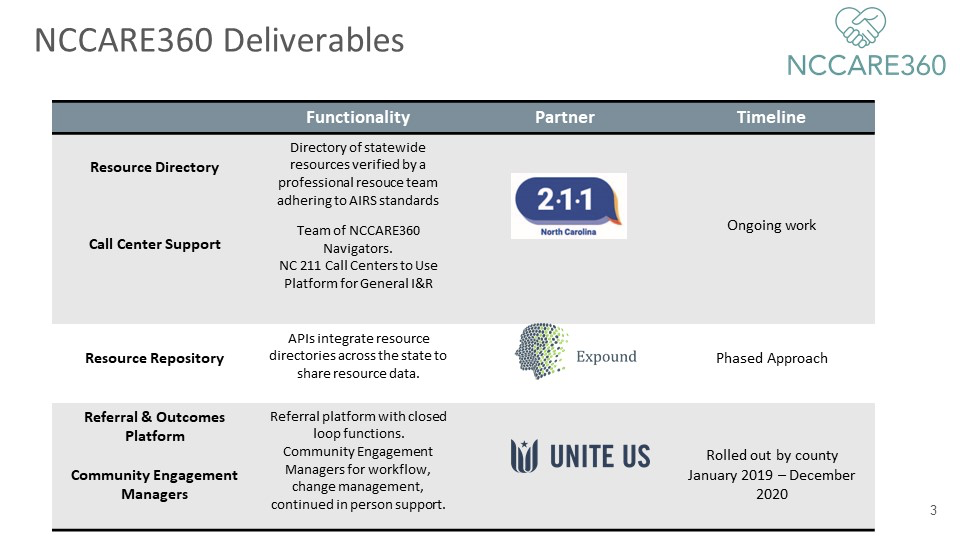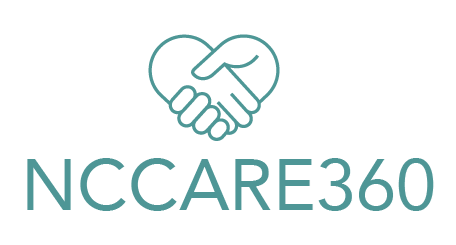[This post is from Laura Marx, President and CEO of United Way of North Carolina. Welcome, Laura!]
In 2019, the first statewide health and human service care coordination platform launched in North Carolina: NCCARE360.
Part of a broader healthy opportunities network envisioned by the state Department of Health and Human Services (NC DHHS) — NCCARE360 provided our state an opportunity to build a collaborative model of care coordination between health care providers and community based organizations (CBOs) focused on ensuring patients connect with services addressing social determinants of health (SDoH).
NCCARE360 is supported by the Foundation for Health Leadership and Innovation in partnership with NC DHHS. The United Way of North Carolina/NC211 is building this care coordination infrastructure in partnership with Expound Decision Systems and UniteUs.

The platform’s foundational components include:
- A robust statewide resource directory that will include a call center with dedicated navigators, a data team verifying resources and text and chat capabilities.
- A data repository to integrate resource directories across the state to share resource data.
- A shared technology platform that enables health care and human service providers to send and receive secure electronic referrals, seamlessly communicate in real-time, securely share client information and track outcomes.
- A community engagement team working with community-based organizations, social service agencies, health systems, independent providers and more to create a statewide coordinated care network.
The NCCARE360 infrastructure aligns health care providers, community-based organizations, and public services, to ensure that clients are matched with high-quality services — and that the outcomes of such care can be monitored and assessed at scale.
Resource information powered by 2-1-1

The first step to developing this information exchange infrastructure is leveraging the NC211 resource directory. NC211 is a statewide system administered by United Way and supported by 51 local United Ways, health and social service departments in county governments across the state, with the support of the nearly 7800 health and human service agencies who report information about their services. Our resource database has more than 16,000 services statewide, which we update and curate through descriptions at a 5th grade reading level — through a dedicated Resource Team that has now been increased to seven members by the NCCARE360 project.
Open Referral’s Human Services Data Specification and API protocols have enabled NCCARE360 to implement our resource directory interoperability strategy. NC211’s resource data is shared through the NCCARE360 repository that drives the public facing web search interface at nccare360.org, and at the same time this resource data can also be shared with partners such as UniteUs. Using HSDS, UniteUs receives resource data from our statewide repository and will be able to send back updates from organizations that report additional information through the NCCARE360 referral. Beginning in 2021, the repository will also have a developer’s portal where data extract requests can be made to help build localized resource directories, eliminating the need for duplicated efforts in building and maintaining redundant directories among local community-based organizations.
The repository not only makes sharing and updating information simple, but also provides an opportunity to meld various data sets across sectors in one place for use by all. The repository has a governance structure that outlines specific parameters for which the repository can be used, upholding our intent to serve our community as a non-commercial public utility.
Providing coordinated support throughout a patient’s journey
With this backbone of reliable, verified information as our core infrastructure, we’re able to align other key elements to support care coordination across health and human service contexts. For instance, NCCARE360 navigators are embedded in 2-1-1’s call center, and accessible through the UniteUs interface, so that health providers have a specialist who can provide live assistance with high risk and complex needs, such as housing. These navigators support the health provider network in addressing their patients’ social determinants of health – so that all parties can reference the same information even while using different information systems.
Through NCCARE360, providers can share clients’ personal information (with permission) – and identified needs – to be matched with the specific capabilities of other providers utilizing the platform. Providers can make referrals and hear directly back from organizations using the platform, who can indicate acceptance or rejection of the referral and provide updates along the way. Outcomes of this process are captured within the software, and viewable to anyone working on the care team for a specific individual.
NCCARE360 is ending its second year of implementation, despite shifting course during the COVID-19 pandemic. Community-based organizations and health systems are now able to onboard regardless of their geography: all 100 counties now have licensed users benefitting from NCCARE360. This has been especially important as various COVID initiatives have used the platform to streamline referrals from one agency to COVID service providers. The platform is also being used by contact tracers and community health workers, who are using the platform’s resource directory to direct people in need to basic services.
Balancing the realities of COVID-19 response along with continuous onboarding process is challenging. We’re rising to the occasion, and excited to demonstrate the potential for a care coordination platform that can be leveraged for multiple purposes, by multiple partners, addressing the complex demands of holistic care.


Leave a Reply